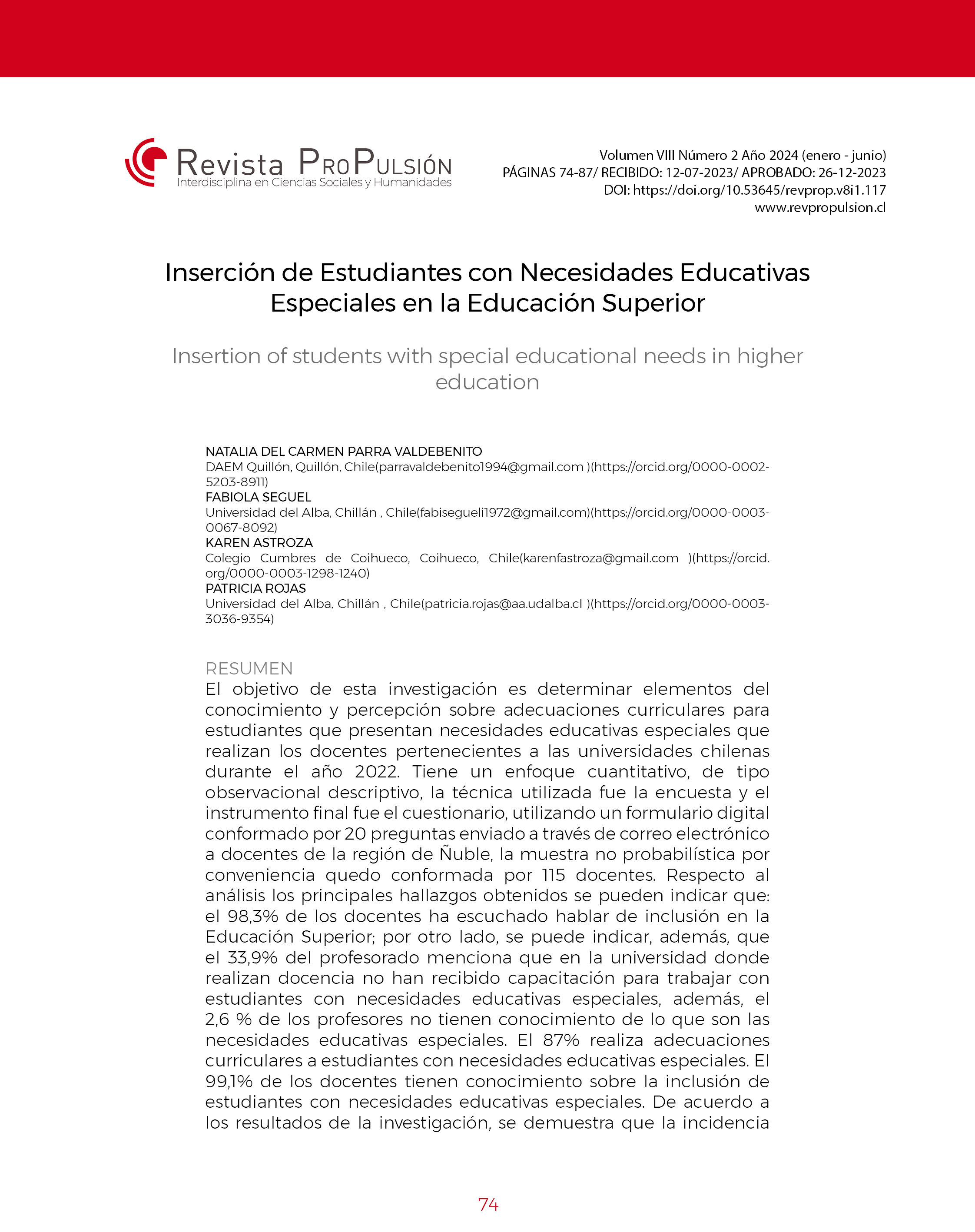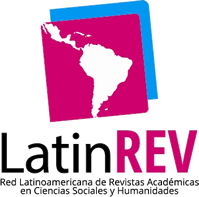Insertion of Students with Special Educational Needs in Higher Education
DOI:
https://doi.org/10.53645/revprop.v8i1.117Keywords:
Inclusion, teaching strategies, university, teachers, special educational needs.Abstract
The objective of this research is to determine elements of knowledge and perception about curricular adaptations for students who have special educational needs carried out by teachers belonging to Chilean universities during the year 2022. It has a quantitative approach, of a descriptive observational type, the technique used was The survey and the final instrument was the questionnaire, using a digital form made up of 20 questions sent via email to teachers in the Ñuble region, the non-probabilistic convenience sample was made up of 115 teachers. Regarding the analysis, the main findings obtained can be indicated that: 98.3% of teachers have heard about inclusion in Higher Education; On the other hand, it can also be indicated that 33.9% of the teaching staff mention that at the university where they teach they have not received training to work with students with special educational needs. Furthermore, 2.6% of the teachers do not They have knowledge of what special educational needs are. 87% make curricular adjustments for students with special educational needs. 99.1% of teachers have knowledge about the inclusion of students with special educational needs. According to the results of the research, it is shown that the incidence of students with Special Educational Needs within the classroom during university teaching practices has led a large number of teachers to ask for help when planning or addressing teaching. inside the classroom.
Downloads
References
Arriagada, C., Jara, L., & Calzadilla, O. (2021). La co-enseñanza desde enfoques inclusivos para los equipos del Programa de Integración Escolar. Estudios pedagógicos, 47(1), 175-195. doi:https://dx.doi.org/10.4067/S0718-07052021000100175
Ayala, J. (2021). Creciendo en la Diversidad : La resilencia del estudiantado con Discapacidad en Universidad Nacional, Costa Rica. MLS PSYCHOLOGY RESEARCH.
Bernal, C. (2010). Metodología de la investigación. Colombia: pearson educación.
Casierra, C., Loor, M., Mejia, M., & Macías, M. (2021). Inclusión: Estrategias didácticas en el proceso de enseñanza aprendizaje del idioma inglés en los estudiantes con discapacidad visual en las universidades manabitas. Ciencias de la educación, 7(2), 1069-1078. doi:http://dx.doi.org/10.23857/dc.v7i2.1846
Castillo, P. (2021). Inclusión educativa en la formación docente en Chile: tensiones y perspectivas de cambio. REXE, 20(43), 359-375.
Educación, M. d. (21 de 04 de 2010). Decreto N°170: Fija normas para determinar los alumnos con Necesidades Educativas Especiales que serán beneficiados de la subenciones para Educación Especial. Obtenido de Biblioteca del Congreso Nacional de Chile: https://www.leychile.cl/N?i=1012570&f=2010-08-25&p=
Equino, L. (2022). Características del diseño de instrumento más eficiente en la evaluación del aprendizaje. Revista de Investigación en Ciencias Sociales y Humanidades., 9(1), 7. doi: https://doi.org/10.30545/academo.2022.ene-jun.1
Figueroa, I., Soto, J., & Yáñez, C. (2019). Concepciones sobre el cambio educativo en docentes de escuelas municipales participantes de un proyecto de desarrollo inclusivo. Revista Educación, 43(1), 16. doi: https://doi.org/10.15517/revedu.v43i1.31297
Gutiérrez, X., & Rivera, C. (2020). Educación Especial y sus implicancias en contextos de diversidad cultural: análisis desde La Araucanía. Revista Historia de la Educación Latinoamericana, 22(34), 95-112. doi:https://doi.org/10.19053/01227238.10106
Hernández, R., Fernández, C., & Baptista, M. (2014). Metodología de la investigación. México: McGRAW-HILL.
Hernández, R., Fernández, C., & Baptista, M. (2017). Metodología de la investigación. México: Mc Graw Hill Education.
Herrera, C. (2021). ¿Dar Cabida o Hacer Parte?. Significados de la Participación en Dos Políticas Inclusivas Chilenas. Revista Latinoamericana de Educación Inclusiva, 15(1), 189-205. doi:https://doi.org/10.4067/s0718-73782021000100189
Landero, G., & Miranda, M. (2020). La educación inclusiva en el marco de la educación supperior. Revista Ibero-americana de Estudos em Educação, 15(4), 2721. doi:https://doi.org/10.21723/riaee.v15iesp4.14519
Maldonado, E., & Flores, H. (2021). Actitud del Profesorado universitario hacia la inclusión educativa: una revisión sistemática. Revista Brasileira de Educação Especial, 27, 1037-1052.
Manterola, C., & Otzen, T. (2014). Estudios Observacionales: Los Diseños Utilizados con Mayor Frecuencia en Investigación Clínica. Int. J. Morphol., 32, 634-645. doi:10.4067/S0717-95022014000200042
Ministerio de Planificación. (10 de 02 de 2010). Ley N° 20422: Establece normas spbre igualdad de oportunidades e inclusión social de personas con discapacidad. Santiago. Obtenido de Biblioteca Del Congreso Nacional De Chile: http://bcn.cl/2nbw4
Perez, L., & Fernandez, A. :. (2013). Discapacidad en Latinoamérica : Voces y experiencia Universitaria. Argentina: Editorial de la Universidad de la Plata.
Ramírez, L., & Martín, J. (2018). Significado del Proceso de Inserción a la Vida Universitaria: Desde una Perspectiva de Aprendizaje como Práctica Social. Revista Latinoamericana de Educación Inclusiva., 12(1), 158. doi:https://doi.org/10.4067/S0718-73782018000100010
Siavil, C., Urquizo, A., Bravo, P., & Moreno, P. (2021). Experiencias en el proceso de Inclusión Educativa en la Eduacación Superior Iberoamericana. CHAKIÑAM.

Published
How to Cite
Issue
Section
Categories
License
Copyright (c) 2024 Natalia Parra, Fabiola Seguel, Karen Astroza , Patricia Rojas

This work is licensed under a Creative Commons Attribution-NonCommercial 4.0 International License.
- Esta licencia permite a los reutilizadores distribuir, remezclar, adaptar y construir sobre el material en cualquier medio o formato solo con fines no comerciales, y solo mientras se dé atribución al creador.Incluye los siguientes elementos: POR – Se debe dar crédito al creador NC – Solo se permiten usos no comerciales de la obra.







